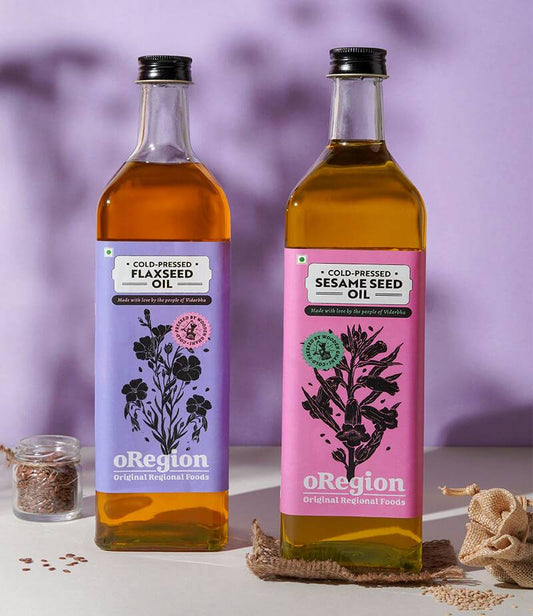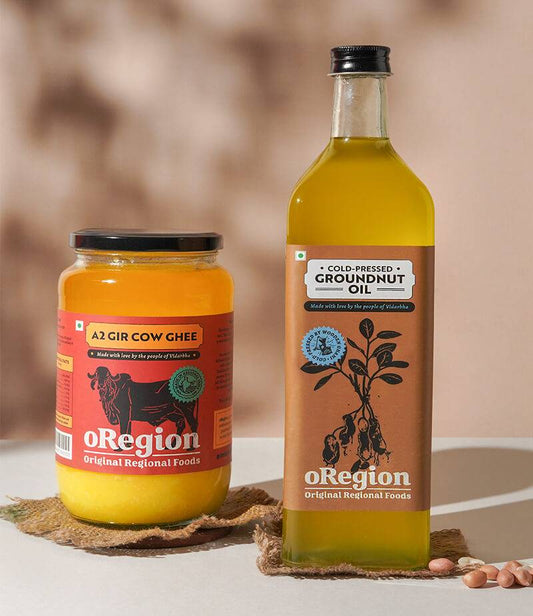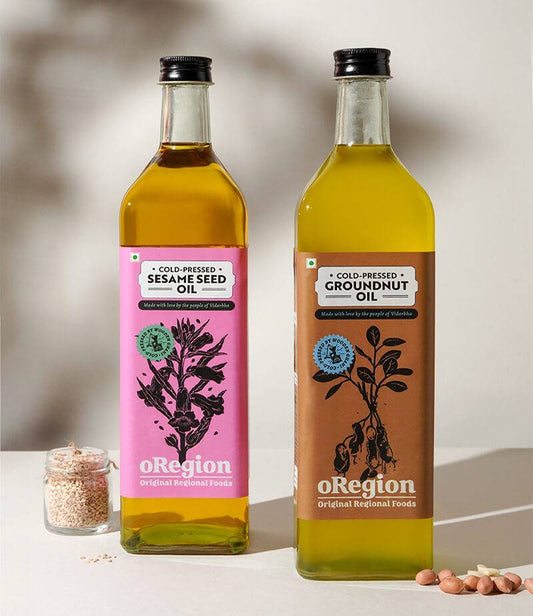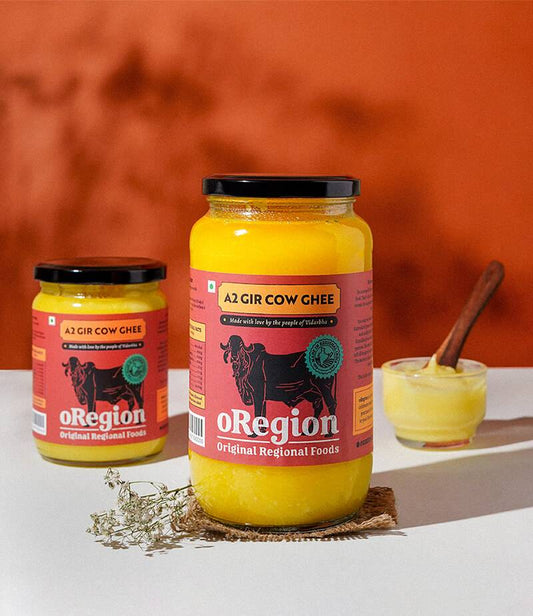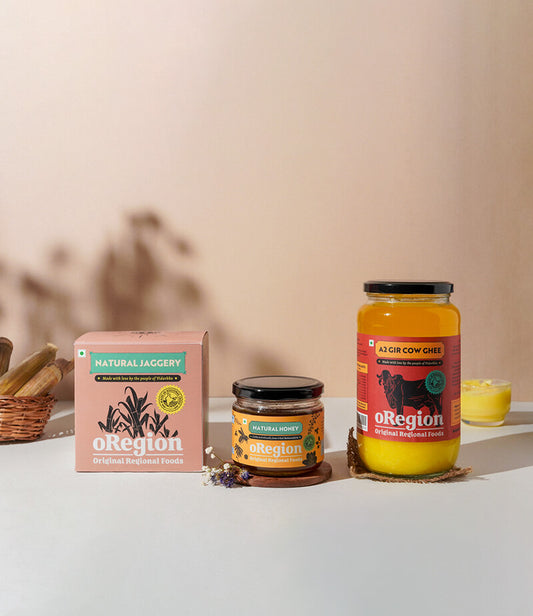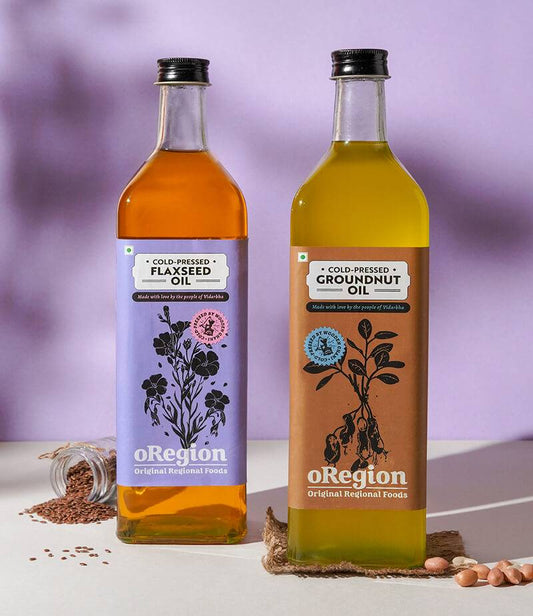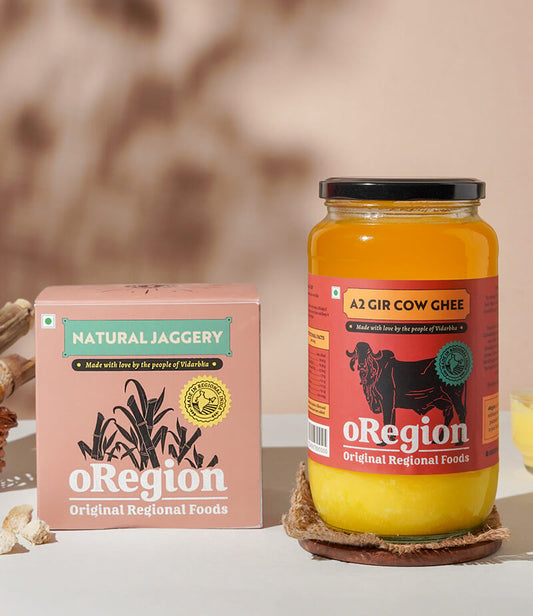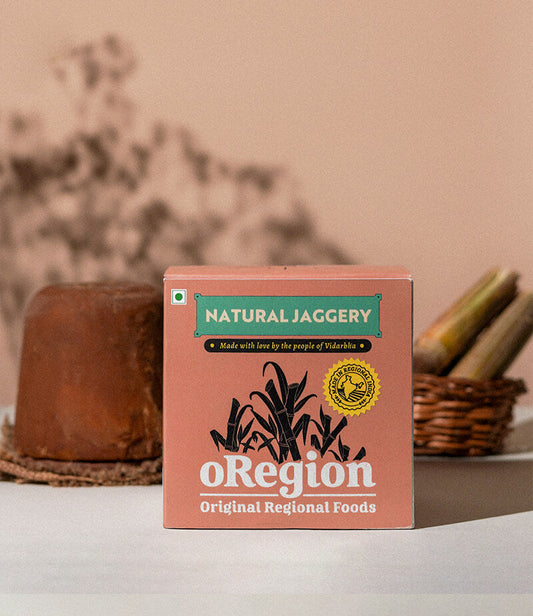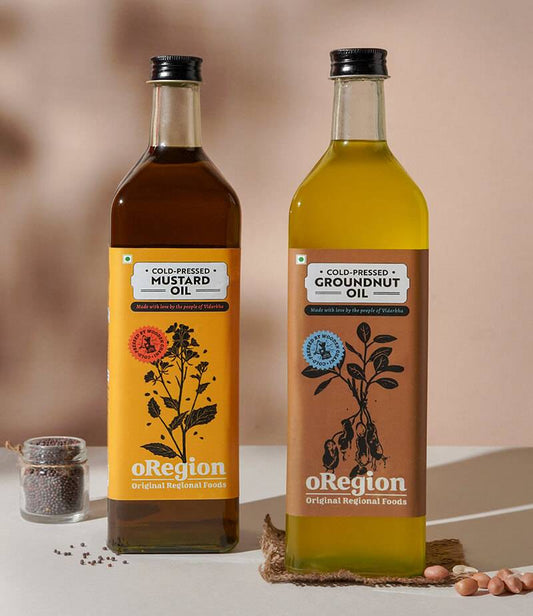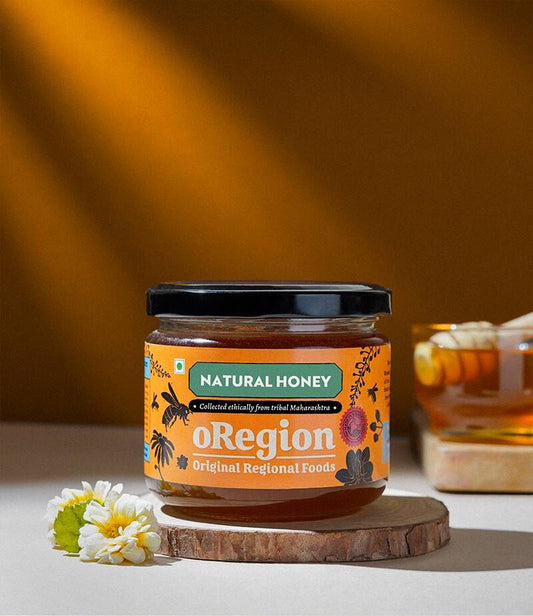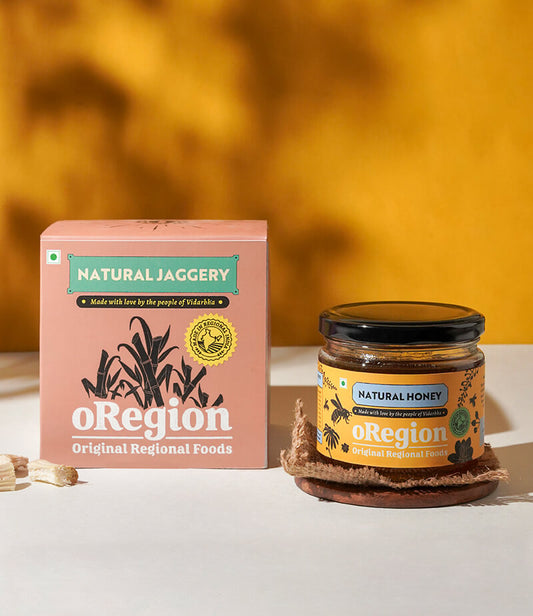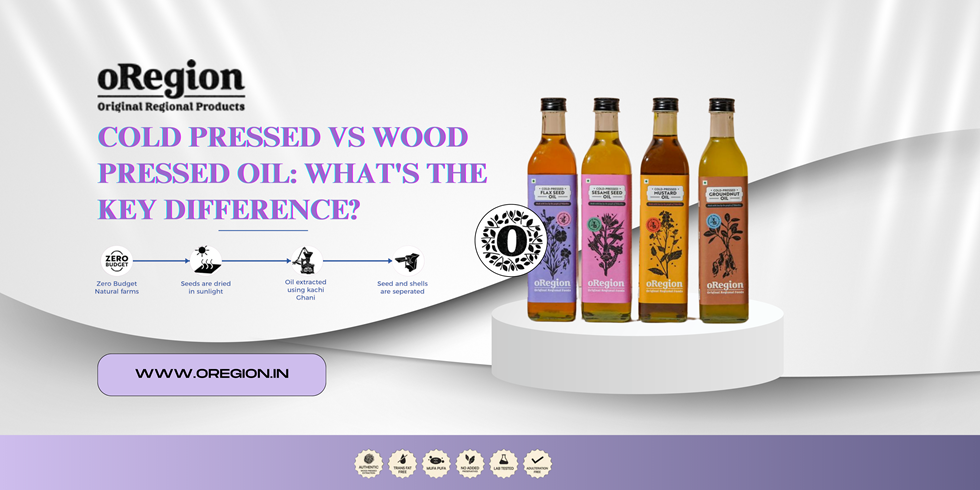
Cold pressed vs Wood pressed oil: What's the key difference?
By oregion foodsWhen it comes to oil extraction, the terms "cold pressed" and "wood pressed" are often used interchangeably, but they actually refer to distinct processes that yield oils with varying qualities. This article will explore these differences, focusing on popular oils such as groundnut oil, flaxseed oil, mustard oil, and sesame oil. By understanding these distinctions, you can make more informed choices for your cooking and health needs.
Understanding Cold Pressed Oil
Cold pressed oil is extracted without the use of heat, ensuring that the oil retains its natural flavor, aroma, and nutritional properties. This method typically involves crushing the seeds or nuts at a controlled temperature, usually below 40 °C. As a result, Cold Pressed Oils are rich in essential nutrients, antioxidants, and flavor compounds, making them ideal for culinary and health purposes.
Key Benefits of Cold Pressed Oils
-
Nutrient-Rich: Cold pressed oils preserve vitamins, minerals, and fatty acids that can be lost in high-heat extraction methods.
-
Flavorful: The gentle extraction process maintains the oils' natural flavors, making them perfect for salad dressings, drizzling, and finishing dishes.
- Health Benefits: These oils are often high in healthy fats, including omega-3 and omega-6 fatty acids, which contribute to overall well-being.
Exploring Wood Pressed Oil
Wood pressed oil, also known as Chekku oil or kachi ghani oil, is derived through traditional methods involving a wooden press. This process typically requires more time and effort but yields oils that are rich in flavor and nutrients. The wooden press crushes the seeds or nuts, extracting oil while minimizing exposure to heat.
Key Benefits of Wood Pressed Oils
-
Traditional Extraction: The wooden pressing method is a time-honored technique that respects the oil's natural characteristics.
-
Higher Antioxidant Levels: Because it involves less processing, wood pressed oils often retain higher levels of antioxidants, contributing to better health benefits.
- Sustainable Practices: Many wood pressed oils are produced by local farmers using sustainable methods, supporting eco-friendly agriculture.
Cold Pressed, Wood Pressed, and Other Methods Explained
The distinction between cold pressed and wood pressed is often misunderstood. In reality, wood pressed oils are just a specific form of cold pressed oils. Here's a breakdown of the extraction methods:
Cold Pressed Method: A general term for any oil extraction process that avoids heat, ensuring nutrient retention. Techniques include:
Wooden Pressed: Uses a wooden press, minimizing heat and preserving flavor.
Stone Pressed: Used stone equipment for crushing seeds or nuts at low temperatures.
Expeller Pressed: Mechanical press extraction with minimal heat, though slightly more than wood pressed methods.
At oRegion, we use the wooden pressed method, which falls under the cold pressed umbrella. There is no significant difference between cold pressed and wood pressed oils, as both involve minimal heat and aim to preserve the natural qualities of the oil. This combination of traditional and modern techniques allows us to offer oils that are rich in flavor, nutrients, and quality.
comparing wood pressed vs expeller Pressed Oil
|
Feature |
Wood Pressed Oil |
Expeller Pressed Oil |
|
Extraction Method |
Traditional method using mechanical wooden presses |
Mechanical pressing using metal machinery |
|
Type of Base |
Wooden base |
Metal base |
|
Operating Temperature |
Wood pressed is below 40 °C |
Expeller can go around 60-90 °C |
|
Nutritional Retention |
Very high, preserving most nutrients |
High, but slightly lower than wood-pressed |
|
Efficiency of Extraction |
Less efficient due to manual processing |
More efficient, yielding higher oil quantities |
|
Cost |
Generally higher due to traditional methods |
Typically lower due to mechanized processes |
Popular Oils and Their Benefits
Groundnut Oil

Cold Pressed Groundnut Oil and Wood Pressed Groundnut Oil are both excellent choices for cooking. Groundnut oil is known for its high smoke point and nutty flavor, making it suitable for frying and sautéing.
-
Best Uses: Ideal for frying, baking, and dressing.
- Nutritional Highlights: Rich in monounsaturated fats, it supports heart health and lowers cholesterol levels.
Flaxseed Oil

Cold Pressed Flaxseed Oil, also known as Alsi Ka Tel, is particularly valued for its omega-3 fatty acids. It's a fantastic vegan source of omega-3s, which are crucial for brain health and overall wellness.
-
Best Uses: Perfect for salad dressings, smoothies, and drizzling over dishes.
- Nutritional Highlights: Promotes cardiovascular health and reduces inflammation.
Mustard Oil

Cold Pressed Mustard Oil and Wood Pressed Mustard Oil are commonly used in Indian cuisine, renowned for their pungent flavor and numerous health benefits.
-
Best Uses: Ideal for cooking, pickling, and marinating.
- Nutritional Highlights: High in omega-3 and omega-6 fatty acids, it supports heart health and reduces cholesterol.
Sesame Oil

Cold Pressed Sesame Oil is prized for its rich flavor and numerous health benefits. It is often used in Asian cuisine and as a cooking oil.
-
Best Uses: Great for stir-frying, dressing, and finishing dishes.
- Nutritional Highlights: Rich in antioxidants and has anti-inflammatory properties.
Why Choose oRegion's Oils?
At oRegion, we prioritize quality and sustainability. Our cold pressed oils, including Cold Pressed Groundnut Oil, Cold Pressed Flaxseed Oil, Cold Pressed Mustard Oil, and Cold Pressed Sesame Oil, are sourced from Zero Budget Natural Farms. The seeds are sun-dried and processed using traditional wooden ghani methods, ensuring that you receive oils that are both delicious and nutrient-rich.
Tips for Storing Cold Pressed Oils
To maximize the shelf life and maintain the purity of your cold pressed oils, follow these guidelines:
-
Store in a Cool, Dark Place: Heat and light are the enemies of cold pressed oils. Store them in a pantry or cupboard away from direct sunlight.
-
Use Dark Glass Bottles: Dark glass bottles help protect the oils from light exposure, preserving their quality.
-
Keep Tightly Sealed: After each use, securely close the bottle to prevent oxidation.
-
Avoid Contamination: Always use clean utensils when handling oils to avoid introducing moisture or foreign substances.
-
Monitor Shelf Life: Cold pressed oils have a shorter shelf life than refined oils. Use them within the recommended time frame for the best flavor and quality.
- Consider Refrigeration for Delicate Oils: Certain oils, especially those high in omega-3s, benefit from refrigeration to slow down oxidation.
Embrace the Best of Both Worlds with oRegion
Choosing oRegion's cold pressed oils means you are opting for products that combine the best of tradition and modern health benefits. Whether you're using groundnut oil for frying or flaxseed oil in a salad, you’re ensuring your body receives high-quality, nutritious oils that are produced with care.
At oRegion, we are committed to bringing you oils extracted through the wooden pressed cold press method. These oils are not only delicious and healthy but also support sustainable farming practices.
Conclusion
In summary, both cold pressed and wood pressed oils offer unique benefits and flavors, making them valuable additions to any kitchen. Understanding the differences between these extraction methods will help you choose the best oils for your cooking needs. At oRegion, we are dedicated to providing the finest quality oils, ensuring that every bottle is filled with the purity and richness of nature.
By following the proper storage and handling techniques, you can enjoy these oils at their best, promoting your health and enhancing your culinary creations. Whether you're cooking with Groundnut Oil, drizzling Flaxseed Oil, or savoring Mustard Oil, you’re not just nourishing your body—you’re also supporting sustainable agriculture and natural farming practices.
